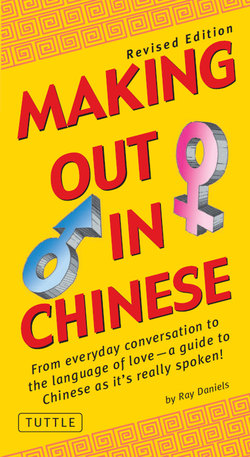Читать книгу Making Out in Chinese - Ray Daniels - Страница 5
На сайте Литреса книга снята с продажи.
ОглавлениеIntroduction
The idea behind Making Out in Chinese is to aid those who wish to speak real Chinese rather than the dry textbook style taught all over the world. No one really speaks textbook English, and the same is true of Chinese, so why not make out using real everyday Chinese? This book will save students valuable study time so that they can quickly move on to communicate naturally. I hope you will be successful in your attempts at making out in Chinese!
INFORMATION
Customs, habits, and traditions vary greatly throughout the world, and the traveler must take this into consideration when encountering other cultures. In my travels throughout China, I have often heard the expression: Nǐmn shīfāng rén hǔn kāifàng. Wǒmn jōnggúo rén hǔnbówshǒ (You Westerners are very liberal. We Chinese are very conservative). The forwardness of Western men and women, particularly in dealings with the opposite sex, has left many Chinese with the impression that Westerners are lacking in morals. If you are amorously interested in a Chinese, or just want to make friends, an indirect approach is recommended. It's better to give subtle hints about your feelings rather than just come out with them directly. The more subtle you are, the more well-intentioned you will seem.
The phrases in this book will be comprehensible in all Chinese-speaking countries. However, the degree of openness, especially in sexual matters, differs from country to country. My own personal ranking, from most liberal to most conservative, is as follows: Hong Kong, mainland China, Macao, Taiwan, Singapore, Malaysia. My high ranking of mainland China may surprise some, but a great deal of openness is due to the number of Chinese seeking a foreign partner (and passport!).
PRONUNCIATION TIPS
All words in Chinese have a tone, and an incorrect tonal pronunciation can greatly change a word's meaning. For example:
The first tone ( - ): The word mā spoken with first tone means "mother." The first tone is an even pitched sound, almost like singing.
Second tone ( ´ ): The word má with second tone means "hemp." The second tone rises, like one would say the word "right?"
Third tone ( ˇ ): The word mǎ spoken with the third tone means "horse." It is pronounced with a lowering of the voice.
Fourth tone ( ̀ ): The word mà with fourth tone means "to scold" (for instance, if one were to reprimand someone, one would mà! the said individual). The fourth tone is spoken sharply, like the word "Damn!"
There is one more tone, må, referred to by the Chinese as "light sound," which indicates that the syllable should be spoken like the fourth tone pronunciation of the word "Damn!" except shorter (as if the speaker had tried to say "Damn" but only had time to pronounce the "da").
I advise the reader not to worry about the tones but to focus on the phonetic transcriptions which have been written so that English speakers can pronounce them easily. Just as English is spoken with different accents, so is Chinese; learners of Chinese must therefore develop an ear for the language.
CONSONANTS
The following offers a guide to the pronunciation of the standard Hanyu Pinyin system of romanization, which is used almost all over the world.
Most consonants are pronounced as in English.
| Chinese | English |
| c | its |
| q | cheat (said with a puff of air) |
| r | urn |
| X | sea |
| z | bits |
| ch | church (said with one's tongue rolled back and with a puff of air) |
| sh | shit (said with one's tougue rolled back) |
| zh | jerk (said with one's tongue rolled back) |
VOWELS
| Chinese | English |
| a | father |
| e | hen |
| i | pin (A simple "i" is pronounced as "e" in he) |
| o | go |
| u | July |
| ü | feud (said with rounded lips) |
| ao | how |
| ei | hay |
| ou | no (said with a slight pull) |
| ui | wait |
The more challenging combinations are as follows:
| ci | its |
| qi | chip |
| si | swing |
| zi | bits |
The "i" in ci , si and zi is silent
In the subsequent sections of the book, the Hanyu Pinyin system of romanization is presented on the right with phonetic transcriptions given below it. Phonetic transcriptions are included to cue you in on the English equivalent of a speech sound in the Hanyu Pinyin system.
TENSES
Tenses are expressed simply in Chinese. If you want to express that you already did something, you can add the word lůh at the end of the sentence. If you wish to express that you will do something, you can use the words jiāng huày. For example.,"I will go" is Wǒ jiāng huày chìu. A sentence can also be made past or future by the use of time words such as míng tiēn (tomorrow) or dzúo tiēn (yesterday). Time is usually mentioned at the beginning of a sentence. For example, "I will go tomorrow" is Wǒ míng tiēn chìu; "I went yesterday" is Wǒ dzúo tiēn chìu lůh .
